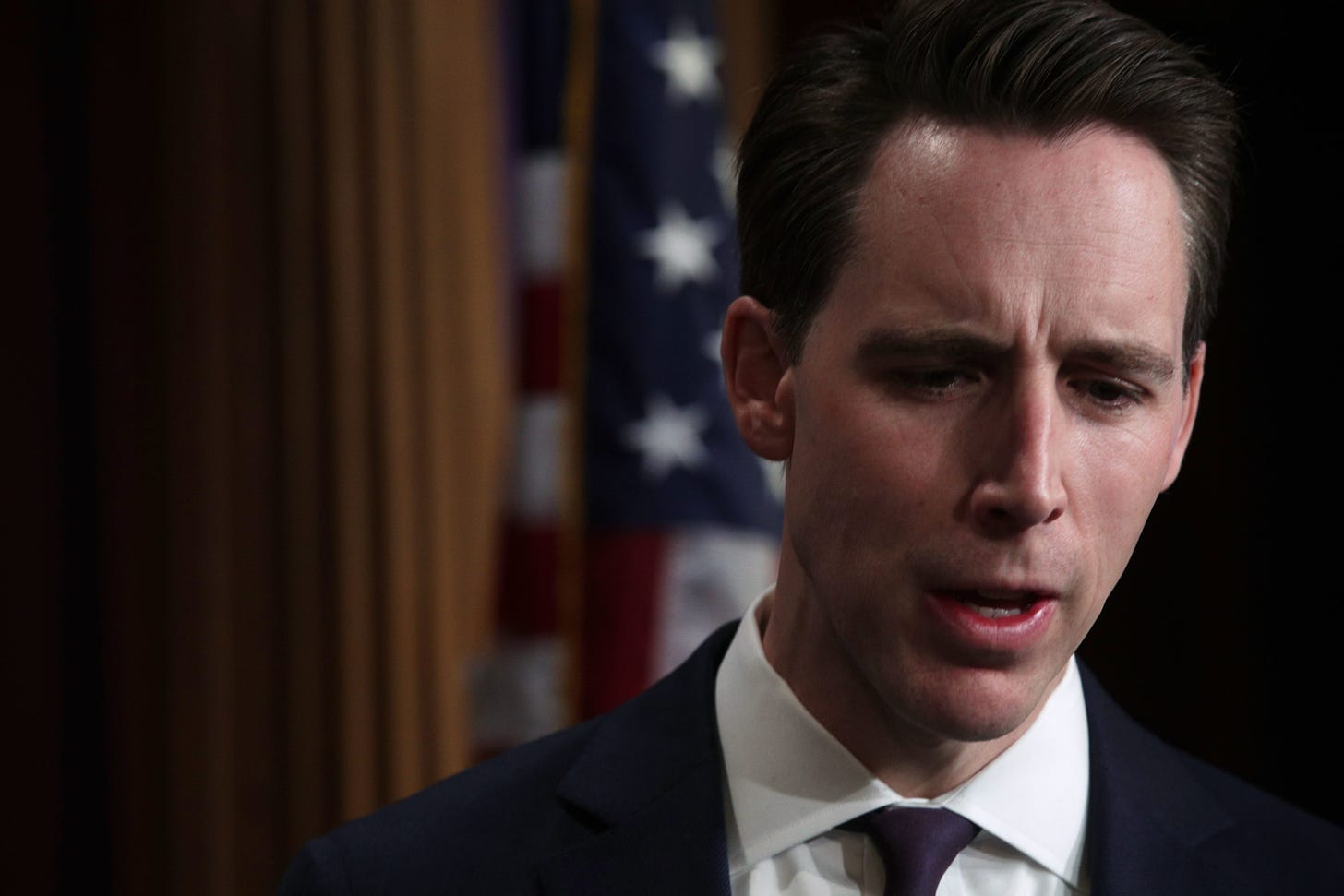Josh Hawley's Terrible, Horrible, No-Good, Very Bad Internet Bill
What's more conservative than ... a call for a vast expansion of the federal bureaucracy?

In his brief time in Washington, freshman Senator Josh Hawley has wasted no time building himself a brand as a new style of sharp-elbowed Republican: One who doesn’t mind picking a fight with big businesses, particularly tech companies, that he believes don’t have the best interests of his constituents at heart. It’s a smart fight to pick at a time when public trust in big tech is cratering on both sides of the aisle, one which has instantly boosted Hawley, the youngest currently serving member of the Senate, into the ranks of lawmakers to watch for. Unfortunately, it’s also given Hawley the confidence to introduce a number of entirely terrible bills.
The latest and worst of these, the “Ending Support for Internet Censorship Act,” arrived Wednesday, and is intended to address an issue that has obsessed Hawley for months: the ways that (he believes) big social media companies are working to stamp out conservative thought on their platforms. The proposed solution is simple: Threaten to hold social media giants criminally liable for any illegal content posted by anybody to their sites unless they establish, to the satisfaction of a new federal bureaucracy created for the purpose, that their content moderation practices do not “negatively affect a political party, political candidate, or political viewpoint.”
The bill rewrites substantial portions of 1996’s Communications Decency Act, a landmark piece of early internet legislation that laid the foundations for a free and open web by establishing many of the rules for who was legally responsible for what content online. The most notable segment, and the one relevant to Hawley’s bill, was Section 230, which reads in part: “No provider or user of an interactive computer service shall be treated as the publisher or speaker of any information provided by another information content provider.”
In practice, what this has meant is that no internet company can be held criminally liable as the publisher of illegal speech—incitement to violence, libel, slander, or the like—simply because they provided a platform for somebody else to make speech considered criminal. To use the example of social media: If some crackpot uses her Facebook account to post libelous attacks against someone else, Section 230 protects Facebook itself from being considered complicit in that crime. This didn’t just help lay the foundations for the internet to flourish, it’s also plainly just: How can social media companies with hundreds of millions of users be held responsible for preventing all illegal speech on their platforms before it even happens?
Color Hawley unimpressed, however. In a press release accompanying the rollout of his bill, he dismisses this seminal piece of internet law as “a sweetheart deal that no other industry enjoys: complete exemption from traditional publisher liability in exchange for providing a forum free of political censorship.”
Here we may note in passing that Hawley’s gloss of Section 230 bears no resemblance to the actual law in question: Far from being a "sweetheart deal," Section 230 simply codifies the common-sense notion that you’re not responsible for my criminal speech just because you sold me a product that helped me say it. Furthermore, nothing in the statute makes that exemption of liability contingent on “providing a forum free of political censorship,” a quote Hawley and others have lifted entirely from a completely different section of the law.
In fact, not only is it from a different part of the law, Section 230 explicitly protects providers regarding "any action voluntarily taken in good faith to restrict access to or availability of material that the provider or user considers to be obscene, lewd, lascivious, filthy, excessively violent, harassing, or otherwise objectionable, whether or not such material is constitutionally protected." In other words, companies have the right, and are specifically encouraged, to moderate the content users post or share on their sites.
Incredibly, it gets worse. Reading the bill, every new paragraph sends the eyebrows higher: For big tech companies to be permitted to re-access the baseline legal protections afforded them by Section 230, an entire new wing of the Federal Trade Commission is to be established to audit these companies for political neutrality. The guidelines for how these newly hired bureaucrats are to make these decisions are hilariously broad: nothing in a company’s algorithms or content moderation practices is permitted to be “designed to negatively affect a political party, political candidate, or political viewpoint,” or to restrict “information from a political party, political candidate, or political viewpoint.” The bill largely leaves the sausage-making for how this is exactly to be accomplished up to the new bureaucracy—the sort of policy-making deference to the executive branch that congressional Republicans like Hawley typically decry. Or used to, at least.
What’s most distressing about all this, however, isn’t any particular provision in the bill at all. It’s in the mindset behind it, which has absolutely no problem with mammoth expansions of federal and executive power to address any momentary political problem which strikes a lawmaker’s fancy. Is Hawley right to focus on the ways in which big tech might not have the best interests of the American people at heart? Of course he is—it’s a refreshing change of pace, especially coming on the heels of years of tiresome technofuturism from both parties in Washington. But he apparently lacks the cautious, pessimistic faculty that habitually has made conservatives sensitive to the way expansions of federal power can be twisted in unexpected and unsavory ways—that might stop to ask, for example, how giving yet another coalition of unaccountable bureaucrats great and opaque cancellation powers over our biggest tech companies is likely to preserve American liberties in the long run rather than to run rampant over them.










